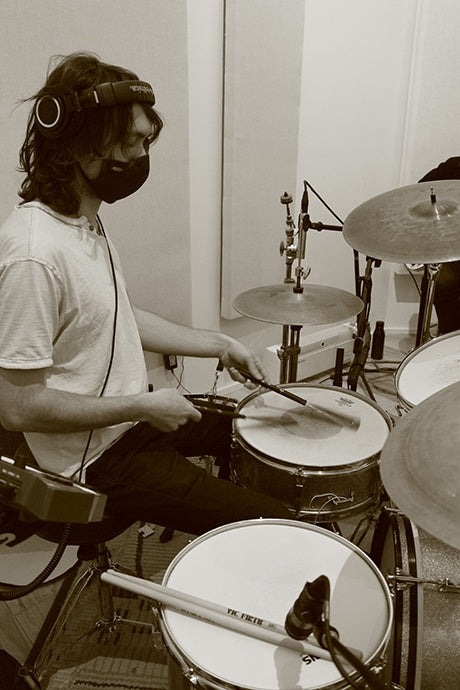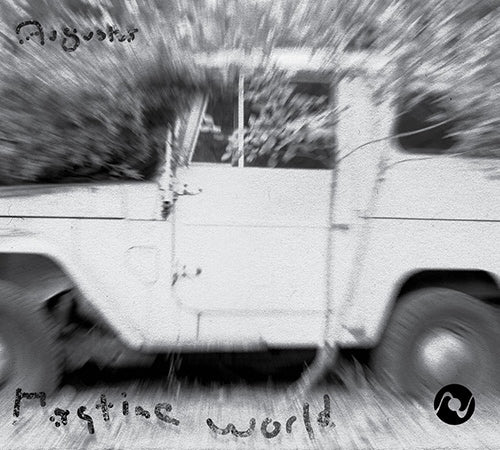Octave Records’ latest release, Ragtime World by Augustus, offers the band’s distinctive blend of melodic indie, alt-rock, post-rock and other not-quite-categorizable music. Since 2014, Augustus has toured the US and recorded five previous studio albums. Their core two-guitars-bass-drums-vocals sound is spiced with a variety of electric and acoustic guitars and amps (vintage guitar heads will have a lot of fun identifying the various gear, all plain to hear on this high-resolution recording) and additional sounds including lap steel guitar, mandolin and even a Mellotron.
Featuring Colin Kelly (guitars, keyboards, vocals) and Jim Herlihy (guitars, mandolin, Mellotron) with John Demitro (bass, lap steel, percussion) and Forrest Raup (drums and percussion), Ragtime World offers an ear-catching and thoughtful variety of songs, reflecting what the band was feeling during the onslaught of the pandemic, when, like every other band, their touring schedule came to a complete stop.
 Jim Herlihy and Colin Kelly of Augustus.
Jim Herlihy and Colin Kelly of Augustus.
Ragtime World was recorded at Animal Lane in Lyons, Colorado in pure DSD using the Sonoma recording system. It’s available as a limited-edition release of 1,000 hybrid SACD discs with the master DSD layer and a CD layer. In addition, the album is available as a download bundle including DSD64, DSDDirect Mastered 192kHz/24-bit, 96kHz/24-bit and 44.1kHz/16-bit PCM. Ragtime World was produced by Nate Cook and recorded and mixed by Jay Elliott, with Giselle Collazo co-recording and co-mixing and Jessica Carson as executive producer.
The music spans a variety of moods, from the rockers “Carry All the Weight,” “Past Life” and “Leave the Lights On” to the ethereal “Daisies,” and the spare, fingerpicked acoustic guitar of the title track. The instruments and equipment included a 1975 Gibson Les Paul Deluxe, 1997 Fender Stratocaster electric and Guild and Martin acoustic guitars, a Hammond organ, Yamaha DX-7 and Roland JD-XI synthesizers and a Yamaha grand piano, Fender Princeton, Vox AC-15 and Silvertone amps, and more.
I spoke with Colin and Jim about the making of Ragtime World.
Frank Doris: How did you guys get together? How did you decide to do the album? Did you have any kind of concept or did it just kind of come together spontaneously?
Jim Herlihy: One day we were both at a show, a friend’s show at a real kind of divey bar in town. And [after a few] drinks we decided that how great would it be to like start our own band together. There was another friend who had a similar vision, and we got together and started hammering out what was the very first incarnation of Augustus, which has morphed considerably from [around 2013] then to now. Fast forward to 2019, and we’re wrapping up three years of consistent touring. Then the pandemic hit. Late last year we got approached by Octave about doing a record. Ragtime World came together much differently than previous records.
Colin Kelly: The normal thing we do is bring songs to the table and then we tour on them. This record was different in that we basically wrote everything right before we went into the studio, rehearsed a couple of times and then just captured it on the record, as opposed to just touring [the songs] for months and months and really living within those tunes. We had to make decisions on the fly and they’re now just permanently out there!
FD: Was it different recording in an “audiophile” studio where you were extremely conscious of getting the sound a certain way, as opposed to typical multitracking and mixing?
CK: Definitely. It was eye-opening. Even just mixing in analog. It was a slower process and we’d always worked really quickly, making a record over a weekend or in 10 days. Also, [with] having to work within a certain number of tracks, there was only so much we could do [as opposed to having unlimited tracks to work with]. That was really cool, to be kind of held back from taking things too far and maybe compromising the tune. FD: Did you work out the arrangements right on the spot? JH: Over years of touring in a four-piece, two guitars, bass, drums lineup and the way Colin writes songs, we had worked out a consistent sort of guitar blend through the years. We typically have specific ideas of, if this guitar does this, the other guitar should do something else. If one guitar is texturally this way, this other guitar should maybe be texturally another way. There’s latitude within that for interpretation, but [we have an] underlying framework that carried over into this session. FD: I hate to use the words “post-rock” or “postmodern rock,” but I get the sense that your music is borne out of everything that’s come before it. It really sounds like your own thing. JH: Thank you. We appreciate being uncategorizable! We try for that. FD: How do you come up with lyrics? CK: There are definitely some pandemic kinds of feelings on this record. [For example,] “Daisies” is about wanting to protect your partner and dealing with those anxieties. Another song is about feeling like you’re feeling guilty over a past life. I don’t know how other people dealt with all the free time [we had during] the pandemic, but I got very contemplative and realized that certain things that seemed under our control weren’t, and [the other way around]. FD: Who are your influences and what bands do you like? JH: I’ve thought about this a lot. And I think my all-time favorite band is the Beatles. Maybe that’s a common answer, but you just can’t take away [the impact of] their entire catalog. I like modern stuff too. Let me call on our big Radiohead fans. FD: What are your plans for touring once that starts up again? CK: We’re going to slowly try and get back to playing again. We have some big gigs coming up and in Denver we’re playing an underground music showcase this month. We’re going to kinda see how things are going, and maybe we’ll have to through the next year. We kind of got burned out on touring before the pandemic hit. JH: We were basically doing the DIY thing, doing everything, making all the arrangements, and it’s hard to stay creative and stay present, stay positive when so much of one’s energy is put into sending e-mails and booking and [things like that] and not playing your instrument. But we’d love to get back into playing when the world is ready to have us. CK: This is definitely a time for rebalancing. FD: There’s the title of your next album! Forrest Raup, John Demitro, Colin Kelly and Jim Herlihy.
Forrest Raup, John Demitro, Colin Kelly and Jim Herlihy.
Forrest Raup.
 John Dimitro.
John Dimitro.



